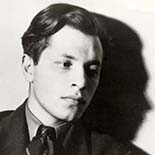 Delmore Schwartz (December 8, 1913 – July 11, 1966) was an American poet and short story writer.
Delmore Schwartz (December 8, 1913 – July 11, 1966) was an American poet and short story writer.
AT A SOLEMN MUSICK
Delmore Schwartz
Delmore Schwartz
Let the musicians begin,
Let every instrument awaken and instruct us
In love’s willing river and love’s dear discipline:
We wait, silent, in consent and in the penance
Of patience, awaiting the serene exaltation
Which is the liberation and conclusion of expiation.
Now may the chief musician say:
“Lust and emulation have dwelt amoung us
Like barbarous kings: have conquered us:
Have inhabited our hearts: devoured and ravished
—With the savage greed and avarice of fire—
The substance of pity and compassion.”
Now may all the players play:
“The river of the morning, the morning of the river
Flow out of the splendor of the tenderness of surrender.”
Now may the chief musician say:
“Nothing is more important than summer.”
And now the entire choir shall chant:
“How often the astonished heart,
Beholding the laurel,
Remembers the dead,
And the enchanted absolute,
Snow’s kingdom, sleep’s dominion.”
Then shall the chief musician declare:
“The phoenix is the meaning of the fruit,
Until the dream is knowledge and knowledge is a dream.”
And then, once again, the entire choir shall cry, in passionate unity,
Singing and celebrating love and love’s victory,
Ascending and descending the heights of assent, climbing and chanting triumphantly:
Before the morning was, you were:
Before the snow shone,
And the light sang, and the stone,
Abiding, rode the fullness or endured the emptiness,
You were: you were alone.
=====
DOGS ARE SHAKESPEAREAN, CHILDREN ARE STRANGERS
Delmore Schwartz
Delmore Schwartz
Dogs are Shakespearean, children are strangers.
Let Freud and Wordsworth discuss the child,
Angels and Platonists shall judge the dog,
The running dog, who paused, distending nostrils,
Then barked and wailed; the boy who pinched his sister,
The little girl who sang the song from Twelfth Night,
As if she understood the wind and rain,
The dog who moaned, hearing the violins in concert.
—O I am sad when I see dogs or children!
For they are strangers, they are Shakespearean.
Tell us, Freud, can it be that lovely children
Have merely ugly dreams of natural functions?
And you, too, Wordsworth, are children truly
Clouded with glory, learned in dark Nature?
The dog in humble inquiry along the ground,
The child who credits dreams and fears the dark,
Know more and less than you: they know full well
Nor dream nor childhood answer questions well:
You too are strangers, children are Shakespearean.
Regard the child, regard the animal,
Welcome strangers, but study daily things,
Knowing that heaven and hell surround us,
But this, this which we say before we’re sorry,
This which we live behind our unseen faces,
Is neither dream, nor childhood, neither
Myth, nor landscape, final, nor finished,
For we are incomplete and know no future,
And we are howling or dancing out our souls
In beating syllables before the curtain:
We are Shakespearean, we are strangers.